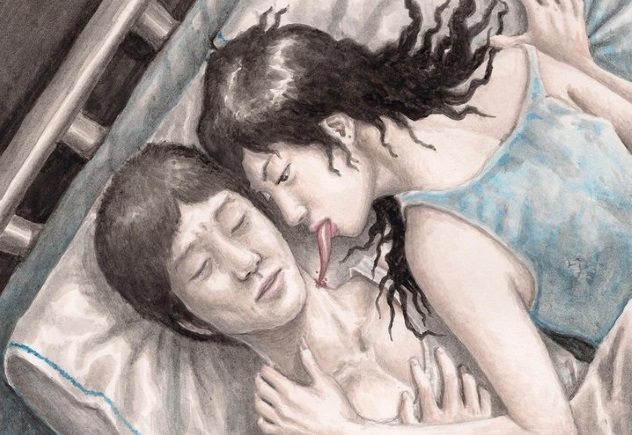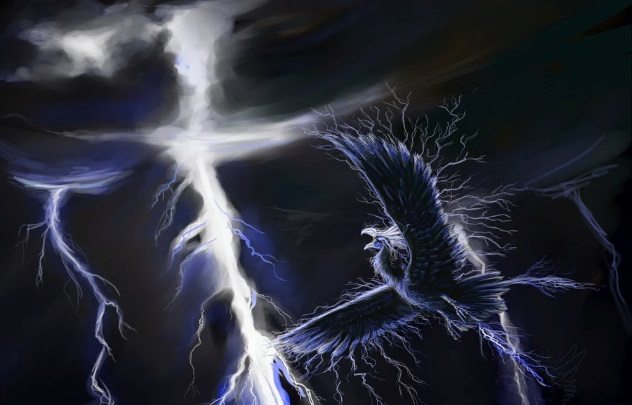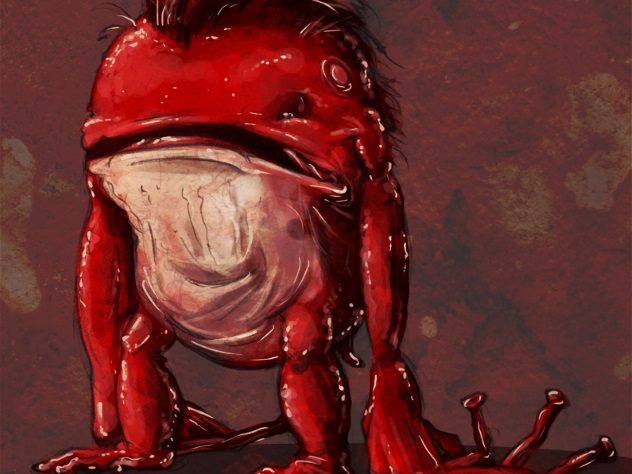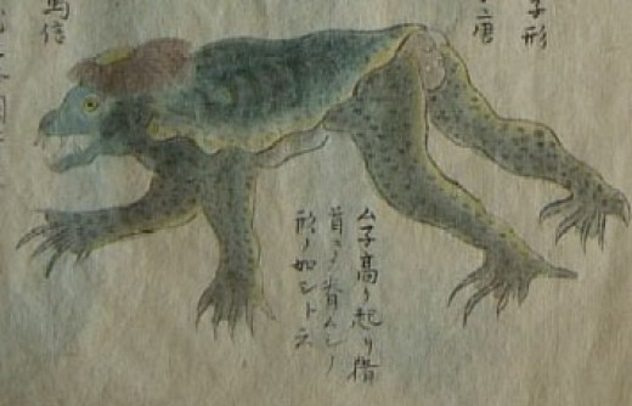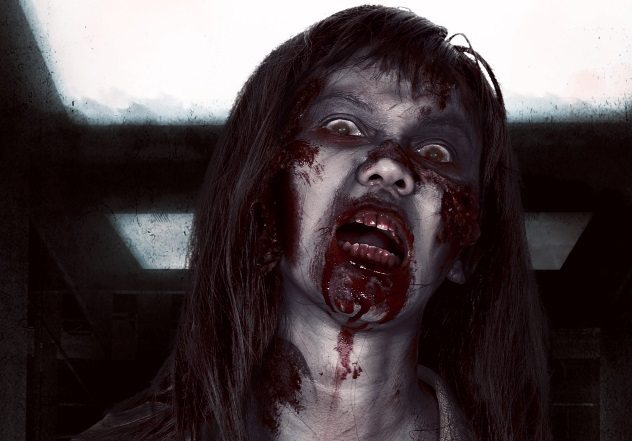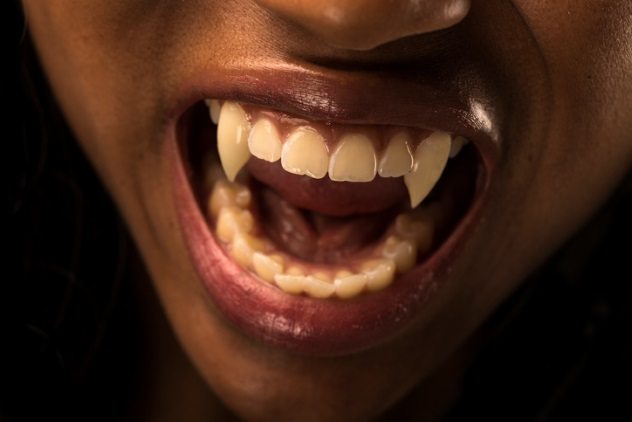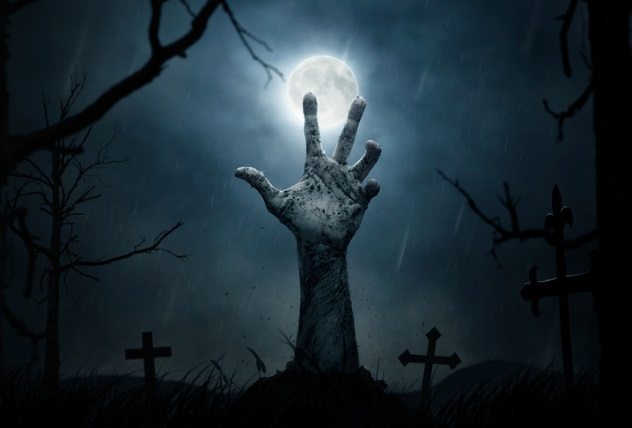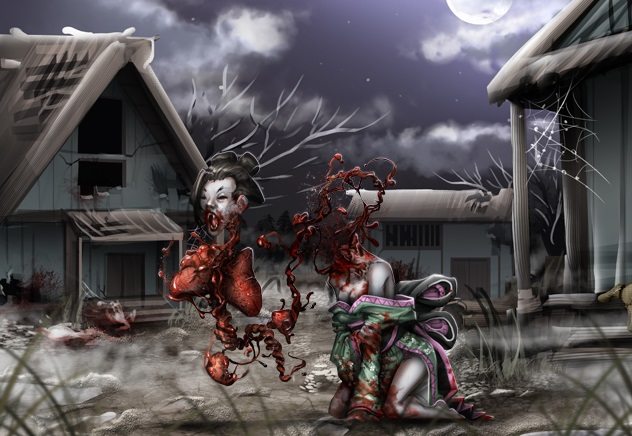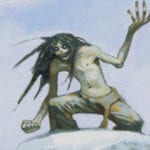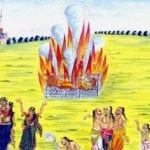However, vampires are only the most celebrated blood-hungry fiends. Most cultures have their own legends of a beast that feeds on human blood. Here are ten of the strangest bloodsuckers out there.
10 Mandurugo
Have you ever had a relationship turn sour? In the Philippines, there is a group of beautiful young women with wings called kinnari. They are gentle characters who are known to be loyal to the human men they take as lovers. If that man is foolish enough to break the kinnara’s heart, then this pliant lover becomes a terrible mandurugo. The mandurugo may keep her pretty appearance by day, but at night, she beds down with an unfortunate man. Using a sharp, barbed, and hollow tongue, she pierces the neck of the man and sucks out his blood. In myth, the mandurugo may marry several times, each husband mysteriously wasting away and dying as she secretly siphons off his blood in the night. In many stories, a clever man who suspects his new bride of being a mandurugo will sleep with a knife in his hand. When he feels the probing of his wife’s tongue on his neck, he will plunge the knife into her heart.[1] You have to imagine that this myth has led to some terribly unsuccessful honeymoons.
9 Impundulu
Also known as the lightning bird, the impundulu is a witch’s familiar from Southern Africa with an insatiable thirst for blood. The witch who allies with an impundulu has a stark choice: She can either send it to kill others or let it kill her to feed its hunger. Given that iimpundulu (yes, that’s the plural) were often passed by witches to their daughters in old age suggests that most found it an easy choice to make. Sometimes taking the form of a beautiful young man or woman, the impundulu, as its alternative name of “lightning bird” hints, can also appear in the form of a bird. The beating of the bird’s wings causes thunder, while lightning is the product of it diving the Earth to lay its eggs.[2] It is up to qualified shamans to find these eggs to stop the world being overrun by lightning birds. The impundulu prefers to drink the blood of humans but is also said to feed on cattle. When they feed on a person’s breath, they are said to cause tuberculosis. In extremity, they will drink milk, and one method of killing an impundulu is to offer it poisoned milk.
8 Yara-Ma-Yha-Who
Australia is famed for being home to some notably dangerous animals. One that often escapes people’s notice is the yara-ma-yha-who. The yara-ma-yha-who is a strange vampire in that it prefers to hunt during the daytime. Those who want to see a yara-ma-yha-who for themselves should pause under a fig tree in Australia. The yara-ma-yha-who is a 1.2-meter-tall (4 ft) creature. Lurking in trees, it will wait for a person to stray beneath before dropping on them. Using the suckers on its hands, as it lacks teeth, it drinks almost all the blood from the person.[3] The still-living victim is then swallowed whole by the yara-ma-yha-who. Not content with eating a person once, it will then vomit up the victim, perhaps to eat them again later. The person who has been attacked in this way by the yara-ma-yha-who somehow comes out of the experience weak but mostly unharmed. They will, however, be a little shorter than they were before, with a subtle red tinge. Those attacked multiple times by the yara-ma-yha-who may find themselves becoming one themselves.
7 Kappa
The kappa is a Japanese monster with several unsettling habits. Not only will it attempt to suck all the blood from a person, but it will also remove the person’s soul via their anus. The kappa is a water-dwelling creature that in most drawings resembles a terrible turtle. Its long limbs protrude from a reptilian body with a shell on its back. These limbs have incredible strength and pull human and animal victims below the water’s surface, where the kappa drains their blood. The head is monkey-like but with a depression on top of the skull. Inside this hollow is a liquid that gives the kappa its strength.[4] To defeat the kappa (who are, murder aside, very polite creatures), one must bow to it. Bowing low in return, the life-giving fluid flows from the kappa’s head, and it dies. You might want to remember that trick, given the other method of attack that kappas have. They are said to reach up into swimmers and steal their livers. To do this, they have to remove the shirikodama from the victim’s anus. The shirikodama in Japanese mythology is said to be a ball inside the anus that contains the soul. Remember not to bow too low.
6 Jiangshi
Jiangshi are vampiric creatures from Chinese mythology, also known as “hopping vampires.” Jiangshi start their second “life” as normal human corpses. If they have been killed by some violent means or have committed suicide, the soul may not be able to leave the body and therefore reanimates it as a jiangshi. Others believe that unburied bodies may return as jiangshi.[5] Cats leaping over a dead body may also cause it come back. The jiangshi are, like Western vampires, definitely dead. Unlike their counterparts in the West, jiangshi undergo the problems all corpses suffer. With rigor mortis setting in, they are unable to walk normally and have to hop after their victims. Methods of repelling these hopping devils include mirrors, peach tree wood, the urine of a virgin boy, and the call of a rooster. The legend of the jiangshi may have developed from the custom of corpses being carried suspended from poles as if standing. The motion of the poles may have made it appear as though the body was hopping along of its own volition.
5 Asanbosam And Sasabonsam
The asanbosam is a vampire found in the trees of Togo and Ghana. It waits in the branches, held in place by curved legs. Anyone passing beneath will find themselves in the clutches of the asanbosam and facing the creature’s sharp iron teeth as it bites out their throat to suck their blood. A humanlike creature, except for their curved legs, the asanbosam has a close relative in the vampire species known as the sasabonsam.[6] The sasabonsam is also a fan of hiding in trees to catch the unwary below but is less humanoid than the asanbosam. The sasabonsam looks more like a bat. Their faces can be human-esque, save for their iron fangs, but their arms are stubby little things compared with their vast wings. The sasabonsam is often described as painfully thin. The only way for it to feed its hunger is to suck the blood of humans.
4 Asema
“Never trust the elderly” seems to be the lesson that the asema is trying to teach us. By day, the asema from Suriname takes the form of a decidedly nonthreatening old person. By night, the asema sheds its wrinkly skin and transforms into a bloodsucker. Instead of taking the horrific demonic form of many vampires, the asema becomes a shining ball of blue light. The blue ball vampire then whizzes through the air in search of a victim. As nothing more substantial than light, it is able to infiltrate even tightly closed-up homes. Once it locates a sleeping victim, the asema siphons off their blood. They may either completely drain their prey, if the blood is especially tasty, or take just enough blood to leave the victim weak. To ward off the asema, you can decorate your home with the traditionally vampire-repelling garlic. If you want extra protection, you can eat herbs that will turn your blood bitter so that the asema isn’t tempted to finish you off.[7] The asema is also apparently unable to resist counting objects. By scattering seeds mixed with the talons of owls around your house, you can distract the asema by forcing it to count the seeds. If they mistake an owl claw for a seed, then they’ll have to start counting all over again, giving you a safe night’s sleep.
3 Soucouyant
The soucouyant of the Caribbean is in many ways similar to the asema. In the soucouyant’s case, an old woman converts herself into a flying ball of fire at night by stripping off her skin. The fireball demon then sneaks into sleeping houses via any crack or keyhole. Anyone she finds inside will have their blood sucked out.[8] Her thirst satisfied, the soucouyant will return to her discarded skin and take human form again. This gives soucouyant hunters their chance to strike. If you find a pile of human skin left by a soucouyant, then you should sprinkle it liberally with salt. When the soucouyant puts on the skin after her night of bloodsucking, she will be driven mad by the salt under her skin making her itchy. The soucouyant is also known as the loogaroo in Haiti. Instead of feeding on the blood herself, the loogaroo is simply collecting it for her master. After a night of blood harvesting, the loogaroo returns to offer it up to the Devil.
2 Strigoi
Hailing from Romania, the strigoi have some claim to being the original vampires that Dracula and all others in the Western tradition are descended from. Strigoi are those who die before their time. Unable to go on to the afterlife, they rise from their graves.[9] Other causes of becoming a strigoi including having a cat jump over your dead body, having been born with hair, or being the seventh child of your parents. In the first 40 days after death, the strigoi may leave their grave in search of blood. They may reappear in spectral human form, exactly as they were when alive, and rejoin their family, only to attack them. They may also appear as a beast or ghost. Once the 40 days are up, the strigoi may become a moroi—a physically present walking corpse that attacks the living. In 2003, a Romanian man named Petre Toma died. His niece became ill after dreaming that her uncle was visiting her each night. This being a classic sign of the strigoi’s attack, Petre’s brother knew he had to act. With five other men, he dug up his brother’s body and removed the heart. This they burned, capturing the ash which it gave off. They fed the ailing niece this ash, and she was cured.
1 Penanggalan
The penanggalan is a vampire from Southeast Asia that is unlike any other. It can often be found as a beautiful young woman by day. At night, her head floats away from her body, trailing intestines and other bits of guts. Now mobile, this hungry head goes off in search of its prey, pregnant women and newborn babies being its preferred victims. The penanggalan lands on the roof of a house where a child is about to be born. With a long, invisible tongue, it laps up the blood shed by women in childbirth. When the child is born, the penanggalan shrieks.[10] Those whose blood the vampire takes suffer from a wasting sickness and are almost certain to die. The penanggalan returns to its home when full of blood and has to soak its swollen guts in vinegar to shrink them enough to fit back into its body. To protect an expectant mother from a penanggalan, thorny leaves are scattered on the floor to drive away its probing tongue. To kill the vampire, it is necessary to find its body when the head is detached. Broken glass can then be stuffed in the neck so that the penanggalan will tear its guts when it tries to reattach its head.
